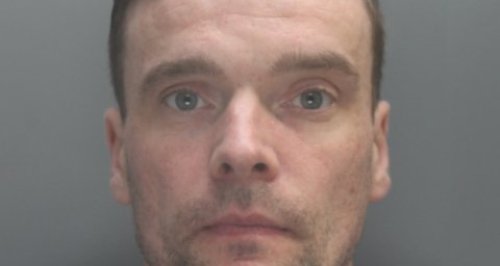'Iceman' Fellows will stay behind bars for life
5 June 2019, 15:42 | Updated: 5 June 2019, 15:43

A double killer hitman who blasted to death an underworld "Mr Big" and a mob enforcer will die behind bars after three of the country's most senior judges rejected an appeal that his sentence was excessive.
Mark Fellows, 38, nicknamed The Iceman, was told in January he would never be released from jail after he was found guilty of the murders of Salford mobster Paul Massey with an Uzi machine gun in July 2015 and three years later the "cold blooded" execution of his friend, mob enforcer John Kinsella, from Liverpool.
Mr Justice William Davies sentenced him to life without parole, following a two-month trial at Liverpool Crown Court, describing Fellows as a contract killer and a "gun for hire" prepared to kill anyone for money who deserved to spend the rest of his days behind bars.
But Fellows, who was slashed with a knife in an attack at maximum security HMP Whitemoor just weeks after he was jailed, was allowed to launch an appeal against that sentence.
His lawyers argued before the Court of Appeal, sitting at Manchester Crown Court on Wednesday, that his crimes were not so "exceptional" he should never be released.
Fellows appeared via videolink from prison, and he apparently had a new scar to the right hand side of his face and the top of his head.
Family members of both Fellows's victims sat in the public gallery listening to the hearing before Sir Brian Leveson, President of the Queen's Bench Division, Mrs Justice Cutts and Sir Peter Openshaw.
Nick Johnson QC, representing Fellows, questioned whether the murders merited a whole life term, suggesting they did not involve a "substantial" degree of pre-planning.
Mr Johnson said despite Fellows trying to disguise himself to cover his tracks, he was caught on CCTV and this did not have the "professional hallmarks" of a contract killer, but was more a "typical Salford gang shooting".
But Paul Greaney QC, who prosecuted the case at trial, said Fellows's planning of both murders was "substantial", with surveillance of the victims, scoping of the area for the planned "execution", and the use of guns which were never recovered.
He said the whole life term is "richly deserved and cannot be described as manifestly excessive".
Dismissing the appeal, Sir Brian told Fellows the trial judge was correct in deciding he should never be released.
He added: "This judgment is one which the learned judge is entitled to make and indeed, having regard to the chilling circumstances of this offending, in our judgment a conclusion which was effectively inevitable.
"Although we have granted leave to appeal, this appeal is dismissed."
Outside court, Massey's former partner Louise Lydiate said: "I'm just pleased with the result. I just thought it was a piss-take to be honest, it was just a waste of everyone's time.
"The next time I want to hear his name is when he's being brought out of prison in a wooden box."
Father-of-five Massey, 55, a notorious "Mr Big" crime figure in Salford and beyond, was blasted at 18 times, hit five times and died on his doorstep on July 26, 2015.
Fellows used an Uzi sub machine gun to shoot down and pursue his victim.
Kinsella, 53, a martial arts expert and mob enforcer from Liverpool, was murdered by Fellows in a second "cold-blooded" execution on May 5, 2018.
Kinsella, whose help footballer Steven Gerrard called on to scare off a Liverpool gangster known as The Psycho who had been "terrorising" him, was shot down while walking his dogs with his pregnant partner, Wendy Owen, near their home in Rainhill, Merseyside.
Fellows cycled up, shot his victim twice in the back with a Webley six-shot revolver and then stood over him to fire twice more into the back of his head from close range.
Fellows's co-accused and "brother in arms" Steven Boyle, 36, who acted as "spotter" in the Kinsella murder, was jailed for life with a minimum term of 33 years before parole is considered.
Both victims, "notorious" heavy criminals in gangland Manchester and Merseyside, were murdered as a result of a deadly feud between rival gangs in Salford - the A-Team - linked to the victims and a splinter faction the defendants were with.






